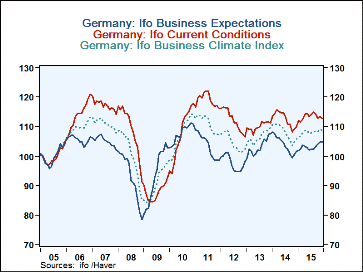 Global| Dec 17 2015
Global| Dec 17 2015Germany's Ifo Backtracks on Mixed Components
Summary
Germany's Ifo business climate index backtracked in December to 10.4 from 10.9 in November. Still, the all-sector climate index stands in the 80.5 percentile of its historic queue of data. Among the components, manufacturing edged [...]
 Germany's Ifo business climate index backtracked in December to 10.4 from 10.9 in November. Still, the all-sector climate index stands in the 80.5 percentile of its historic queue of data. Among the components, manufacturing edged higher in December as all other components fell. Construction fell to 1.8 from November's 2.4. Retailing slipped by nearly a point, falling to 7.3 this month from 8.2 in November. But wholesaling fell the most, dropping from 15.1 in November to 11.8 in December. The monthly wholesaling index drop has only been larger 20% of the time historically.
Germany's Ifo business climate index backtracked in December to 10.4 from 10.9 in November. Still, the all-sector climate index stands in the 80.5 percentile of its historic queue of data. Among the components, manufacturing edged higher in December as all other components fell. Construction fell to 1.8 from November's 2.4. Retailing slipped by nearly a point, falling to 7.3 this month from 8.2 in November. But wholesaling fell the most, dropping from 15.1 in November to 11.8 in December. The monthly wholesaling index drop has only been larger 20% of the time historically.
Despite all the problems overhanging the future for Germany from the migrant issues to the perils of Volkswagen, Ifo expectations rose a tick in December from November while the current conditions index fell by over one point.
The index values for the various Ifo readings are uniformly strong with the exception of manufacturing; even with this month's rise it has a historic queue standing in only its 64th percentile. Manufacturing still cannot seem to get in gear and global excess capacity and slack demand haunt that sector. Still, manufacturing is at its highest reading in seven months. Construction stands in the 98th queue percentile and retailing stands in its 90th queue percentile, both quite elevated readings. However, retailing is slipping, having had a raw diffusion reading of 14.8 as recently as September. Wholesaling, while sporting a strong 82nd percentile standing, is also slipping and have been lower than its December value last back in June of this year.
While many of the German sector indices are strong in their own historic profiles, both retailing and wholesaling have fading momentum. Construction is waffling. Manufacturing is moderate but has some upward momentum. For Germany, still strong current readings are clashing with deteriorating momentum. Where will this lead?
Summing Up
On balance, the Ifo tells a mixed picture of the German economy. No sector is weak. But the German economy normally leans on the manufacturing sector and that is the weakest sector now. Still, manufacturing does have some positive momentum. Wholesaling and retailing are at strong levels, but each is losing momentum. These details paint a mixed picture of Germany and set an unsure path for the future. Germany no longer looks to be such a stalwart in the EMU. Its inflation rate is also becoming one of the higher ones among EMU members.
While it has not affected German optimism about the future, the migrant issue and the challenge to Germany's key corporation, Volkswagen, continue to cloud any outlook. The Bundesbank continues to be at odds with the ECB. German consumer and business optimism have been strong for a long period while the rest of Europe has been weak. Now both consumer and business optimism in Germany have started to erode, but both still maintain high historic readings. There are several clear challenges to German economic welfare apart from those that may attend any EMU member. For the time being, Germans are still optimistic and resolute. But can that continue in the face of the coming challenges?

Robert Brusca
AuthorMore in Author Profile »Robert A. Brusca is Chief Economist of Fact and Opinion Economics, a consulting firm he founded in Manhattan. He has been an economist on Wall Street for over 25 years. He has visited central banking and large institutional clients in over 30 countries in his career as an economist. Mr. Brusca was a Divisional Research Chief at the Federal Reserve Bank of NY (Chief of the International Financial markets Division), a Fed Watcher at Irving Trust and Chief Economist at Nikko Securities International. He is widely quoted and appears in various media. Mr. Brusca holds an MA and Ph.D. in economics from Michigan State University and a BA in Economics from the University of Michigan. His research pursues his strong interests in non aligned policy economics as well as international economics. FAO Economics’ research targets investors to assist them in making better investment decisions in stocks, bonds and in a variety of international assets. The company does not manage money and has no conflicts in giving economic advice.
More Economy in Brief
 Global| Feb 05 2026
Global| Feb 05 2026Charts of the Week: Balanced Policy, Resilient Data and AI Narratives
by:Andrew Cates






